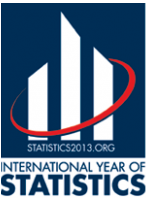 In my professional work, I use statistics to help businesses make sense of their data. By applying statistics to their wide array of business data, senior executives can gain deep insight about actions they can take to drive their business forward. Apart from this narrow application of statistics, I am a big believer that understanding statistics and statistical concepts provides great value to all aspects of society, including politics, biology, chemistry and psychology to name a few. Generally speaking, in each area, statistics are applied to their unique data sets to understand how the world really works. With the explosive interest in the area of Big Data, the application of statistics to our lives continues to grow. The bottom line: People who understand statistics and how it can separate the signal from the noise of their data will be able to make better decisions.
In my professional work, I use statistics to help businesses make sense of their data. By applying statistics to their wide array of business data, senior executives can gain deep insight about actions they can take to drive their business forward. Apart from this narrow application of statistics, I am a big believer that understanding statistics and statistical concepts provides great value to all aspects of society, including politics, biology, chemistry and psychology to name a few. Generally speaking, in each area, statistics are applied to their unique data sets to understand how the world really works. With the explosive interest in the area of Big Data, the application of statistics to our lives continues to grow. The bottom line: People who understand statistics and how it can separate the signal from the noise of their data will be able to make better decisions.
It Is All About Sampling Error
We rarely (never) have access to the entire population of things which interest us. Instead, we rely on measuring a sample of that population to make conclusions about the entire population. The use of statistics helps you understand if the observations you see in your sample likely reflect what you would see in the population.
If there is one thing that you need to know about statistics is the notion of sampling error. Sampling error reflects the difference of the sample of data from the population of data from which that sample was drawn. That is, when samples are used to estimate the population, you need to consider errors in estimating the population. Because the sample is only a subset of the population, our estimation includes error due to the mere fact that the sample is only a portion of the population. A good example of this notion occurred recently in the 2012 US Presidential election. Nate Silver, using publicly available polling data (with sample sizes of around 1000, each) correctly predicted the outcome of the presidential election for each state!
The Statistics Knowledge Gap
United States faces a huge knowledge gap to fill jobs that will be driven by the new, data-driven economy. McKinsey and Company estimates that the US faces of huge shortage of people who have the skills to understand and make decisions based on the analysis of big data, suggesting that the unmet need for data scientists is a problem for emerging fields like Big Data and undercuts the value of Big Data. In addition, because the US students rank 31st in math and 23rd in science compared to the rest of the world, there is no better time to start educating US students on statistics to help fill that shortage.
The International Year of Statistics 2013
Here is another thing you need to know about statistics. I came across a blog post the other day at AllAnalytics where I learned that 2013 is the International Year of Statistics. Also referred to as Statistics2013 (www.statistics2013.org), this international event is supported by over 1400 organizations. Their hope is to improve the value of statistics in the eyes of the world by showing how statistics “improves the quality of your life and greatly advances our global society.” Practically speaking, this site contains different resources for those people who want to learn about statistics, teach statistics or are looking to make a career in the field of statistics. For these resources and others, I recommend a visit to the site for those who want to whet their appetite about statistics.



